#postgrowth
Explore tagged Tumblr posts
Text
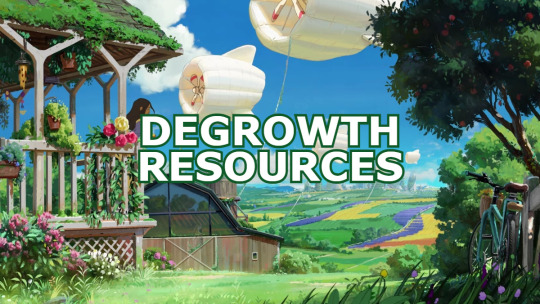
Degrowth basics
"The word degrowth stands for a family of political-economic approaches that, in the face of today’s accelerating planetary ecological crisis, reject unlimited, exponential economic growth as the definition of human progress."
What is Degrowth? | Caracol DSA
Why degrowth is the only responsible way forward | OpenDemocracy
Degrowth and MMT: A thought experiment
We Need A Fair Way To End Infinite Growth | Current Affairs
Degrowth: A Call for Radical Abundance | Common Dreams
Can degrowth save us and the planet? | Nottingham Trent
Defending limits is not Malthusian | Undisciplined Environments
Can We Have Prosperity Without Growth? | New Yorker
The Urgent Case for Shrinking the Economy | The New Republic
Giving Up on Economic Growth Could Make Us Cooler and Happier | The New Republic
A guide to degrowth: The movement prioritizing wellbeing in a bid to avoid climate cataclysm | CNBC
What is ‘degrowth’ and how can it fight climate change? | Popular Science
Enough for Everyone | Yes! Magazine
Toward a Post-Capitalist Future: On the Growth of “Degrowth” | Lit Hub
All we are saying is give degrowth a chance | The RSA
A pathway out of environmental collapse | newsroom
On Technology and Degrowth | Monthly Review
What is degrowth (and more importantly, what is it not)? | META
Green growth
"There is no empirical evidence that absolute decoupling from resource use can be achieved on a global scale against a background of continued economic growth."
Is Green Growth Possible? | Jason Hickel & Giorgos Kallis
The Myth of America’s Green Growth | Foreign Policy
The decoupling delusion: rethinking growth and sustainability | The Conversation
Is green growth happening? | Uneven Earth
Green Growth | Uneven Earth
The Delusion of Infinite Economic Growth | Scientific American
Degrowth is not austerity – it is actually just the opposite | Al Jazeera
A response to Paul Krugman: Growth is not as green as you might think | Timothée Parrique
Deceitful Decoupling: Misconceptions of a Persistent Myth | Alevgul H. Sorman
Degrowth isn’t the same as a recession – it’s an alternative to growing the economy forever | The Conversation
Degrowth and the left
"In the middle of an ecological emergency, should we be producing sport utility vehicles and mansions? Should we be diverting energy to support the obscene consumption and accumulation of the ruling class?"
The Left should embrace degrowth | New Internationalist
Ecosocialism is the Horizon, Degrowth is the Way | The Trouble
Degrowth: Socialism without Growth | Brave New Europe
Toward an Ecosocialist Degrowth: From the Materially Inevitable to the Socially Desirable | Monthly Review
For an Ecosocialist Degrowth | Monthly Review
Degrowth and Revolutionary Organizing | Rosa Luxemburg NYC
The necessity of ecosocialist degrowth | Rupture
Degrowth is Anti-Capitalist | Protean Mag
Degrowth Communism | PPPR (Part one | Part two | Part three)
Economic Planning and Degrowth: How Socialism Survives the 21st Century | New Socialist
Degrowth and the South
"Southern countries should be free to organize their resources and labor around meeting human needs rather than around servicing Northern growth."
Who is afraid of degrowth? A Global South economic perspective | IBON Foundation
The anti-colonial politics of degrowth | Jason Hickel
Unlearning: From Degrowth to Decolonization | Rosa Luxemburg NYC
Degrowth requires the Global South to default on its foreign debts | Resilience
Journals/Reports
Degrowth: a theory of radical abundance | Jason Hickel
A systematic review of the evidence on decoupling of GDP, resource use and GHG emissions, part II: synthesizing the insights
What does degrowth mean? A few points of clarification | Jason Hickel
Providing decent living with minimum energy: A global scenario | Global Environmental Change
Urgent need for post-growth climate mitigation scenarios | Nature Energy
Degrowth and critical agrarian studies | Julien-François Gerber
Decoupling debunked – Evidence and arguments against green growth as a sole strategy for sustainability | European Environmental Bureau
Incrementum ad Absurdum: Global Growth, Inequality and Poverty Eradication in a Carbon-Constrained World | David Woodward
Degrowth can work — here’s how science can help | Nature
A New Political Economy for a Healthy Planet | Jason Hickel
Planning beyond growth. The case for economic democracy within limits
Millionaire spending incompatible with 1.5 °C ambitions | Cleaner Production Letters
Is green growth happening? An empirical analysis of achieved versus Paris-compliant CO2–GDP decoupling in high-income countries | The Lancet
Books
Exploring Degrowth: A Critical Guide | Pluto Press
A People's Green New Deal | Max Ajl
Less is More: How Degrowth Will Save the World | Jason Hickel
Breaking Things at Work: The Luddites Are Right About Why You Hate Your Job | Verso Books
The Future is Degrowth: A Guide to a World Beyond Capitalism | Verso Books
The Imperial Mode of Living: Everyday Life and the Ecological Crisis of Capitalism | Verso Books
Marx in the Anthropocene: Towards the Idea of Degrowth Communism | Kohei Saito
Degrowth & Strategy: how to bring about social-ecological transformation
27 Essays and Thoughts on Degrowth | Giorgos Kallis
Videos
Yes To Limits To Growth! | The Other School
How Degrowth Can Save the World | Andrewism
How We End Consumerism | Our Changing Climate
Demystifying Degrowth | Rosa Luxemburg NYC
Degrowth is not Austerity | John the Duncan
Degrowth and Ecosocialism | Planet: Critical
Degrowth in 7 minutes: Fighting for climate by living better | Think That Through
The Future is Degrowth (w/ Aaron Vansintjan) || SRSLY WRONG
"Degrowth means power to the working class!"with Jason Hickel | GND Media
Others
degrowth.info
Degrowth Journal
Doughnut Economics
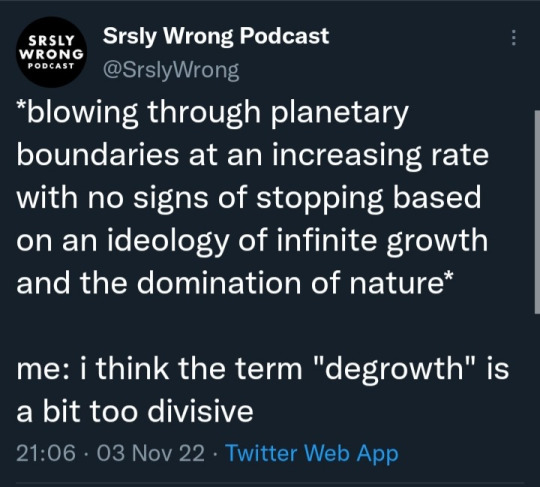
3K notes
·
View notes
Text
Transportation

https://www.amazon.ca/Futuristic-Cars-Space-Bicycles-Contesting/dp/1802078347
1 note
·
View note
Text
Liminality is generally understood as a state in which "the usual order of things is suspended, the past is momentarily negated and the future has yet to begin" (Pearce 2013). But what if things are suspended for good, the present (moment) is all that life revolves around, and the future never starts? Turner observed that "liminality is both more creative and more destructive than the structural norm" (1982: 47). What if liminality were an extended, even permanent condition that denotes a process of negotiating between aspiration and inner void, between freedom and precariousness? What if liminality and a sense of belonging coexisted to form a phenomenon I call "moratorium migration," that is, migration that is used by migrants as an instrument to gain time to postpone rethinking what they wish to spend their lives on due to a lack of more appealing alternatives? [...]this postliminal condition, that is, extending liminality and ensuing "non-identity" as belonging, is the key feature characterizing "post-growth" societies.
Suzanne Klein, Urban Migrants in Rural Japan: Between Agency and Anomie in a Post-growth society, 2020
10 notes
·
View notes
Text
Four types of reading (and notes-taking) strategies

The actual doing of a PhD (and research) can be simply described as reading and writing. However, this doesn't tell much about what to read, how to read, and implications for notes-taking and writing, where there are much variations exist than looking from the surface. Should I read book or paper? Full length / cover to cover or just flipping through? Should I write summary of ideas, critiques, or articles? How to organize these notes? These questions are particularly perplexing at the beginning of one's research journey / PhD journey and are easily overwhelming.
Looking back from one year into my PhD (in design, but generally applicable to transdisciplinary studies in wider social sciences / humanities), I see four types of reading that serves different purposes at various stages.
read to scan the landscape
This is the reading that takes a majority of my time in the first year of PhD. The nature of transdisciplinary study determines that a lot of grounds need to be covered before one develops an idea how her research is positioned in historical/disciplinary contexts. In this stage I read widely (and often in rotation) on topics including (looking down from my desk and on the stacks of papers on the ground):
sustainability, degrowth and postgrowth, ecological economics
theories on embodiment, practice theory, cognitive science and ecopsychology
entrepreneurship studies, entrepreneuring, sustainable entrepreneurship
action research and transdisciplinarity
postqualitative methods, more-than-human methods, non-representational theories
Ecofeminism, political ecology, environmental ethics
complexity theories
Once I was asked the question "are PhDs really that busy?", I tried to describe my confused, lost and almost drowning feeling at the start of my first year. Now I see it is a necessary stage to go through (and maybe experience again when entering new fields) as certain "conceptual system" and vocabulary needs to be established.
The purpose of this stage is not to learn by heart and each theory and author that you encounter, but to "get a rough sense" what are the important themes that interests you in concerned fields. Therefore I don't recommend reading books too early in this process and spend too much time do detailed reading and notes-taking. Sometimes even just doing abstract reading is enough. Also as in this early stage you don't necessarily have the research question, or it is still very roughly phrased, some common advices like "read with a question", or to follow Niklas Luhmann to not to quote what you are reading but make connection to your question simply don't apply.
This stage is like how life and pattern is emerging from chaos... what matters are the general feeling of the field in general, recognition of a few key authors, and identifying a few groundbreaking articles/books and good review articles.
In terms of notes-taking, I heavily rely on physical copies of paper (despite not best for the environment). Printed copies leave physical artifacts which 1) remind us their existence 2) can be re-organized and re-grouped later according to our latest conceptual model.
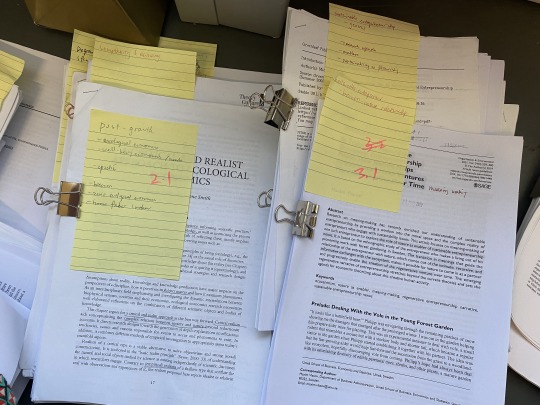
I find writing a few points that touches me (not necessarily the authors' most important arguments) on the top of the cover page of the paper works for me. If time allows I may put them into Roam Research (my notes-taking app), but it is not compulsory. But leaving multiple traces of materials encountered, including print it out, add entry in endnote, and write down authors and book/paper titles in one central place (e.g., Roam Research, not a random notebook!) are highly recommended. This would help tramendously particularly in stage 3.
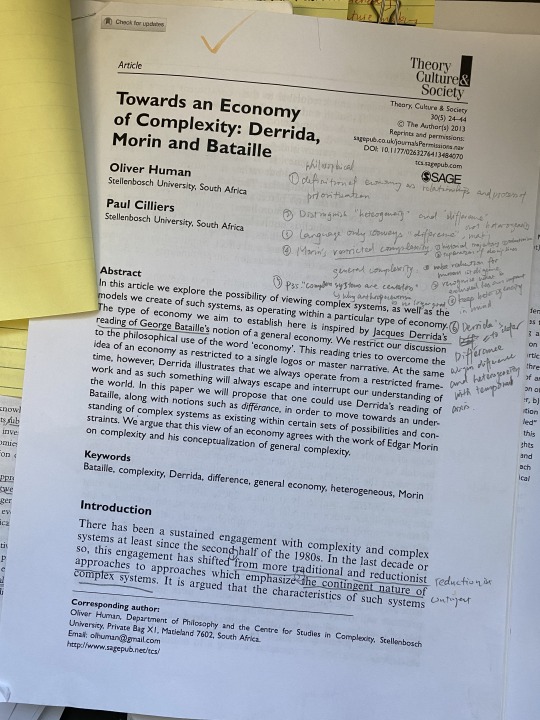
2. read to understand the fundamentals
By the end of the first stage, you should be 1) developing a sense what a field is about and how it is related or different from relevent fields 2) what are the most important theories and authors that everyone start their research with. The second type of reading is therefore to single out these authors and their most important work. For papers I suggest to read them in full length. For books deep reading at least introduction chapter and selective chapters of interest. Take good notes including important definitions, concepts and quotes. Mark clearly citation and page numbers. These reading notes will be used again and again in the future for writing conference papers / journal articles / thesis.
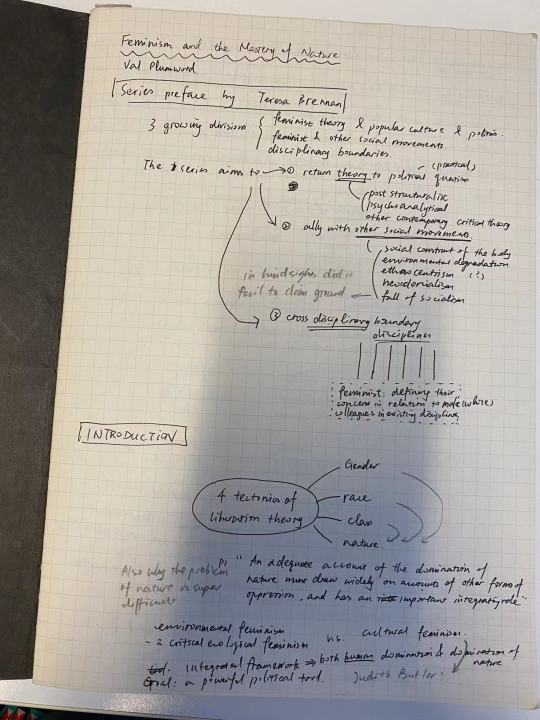
I have to admit this kind of reading is a luxury particularly given my "academic ADHD" that I described in the last post. However, I see this deep reading and engagement with important writers fundamental in forming my own thinking. Also, when presented a new theory, the first impression may be the sharpest in terms of potential conflicts with existing knowledge. This provides perfect entry for critical evaluation and development of your own thoughts. Therefore I do recommend active reading (as suggested in "how to read a book") and to write your first reactions either on the margin of the book, in a notebook or in your notes-taking system.
When it comes to this deep engagement with books/papers, notes-taking is always a struggle. On one hand, reading offline (facing book and notebook, not a screen) helps me to concentrate and think. On the other hand, offline written notes present real challenge to locate in future research. I don't have a definite answer on this yet.. Sometimes I take notes in Roam directly, other times I write notes with pen and paper (but seldomly type them into Roam). I'm also trying to take picture of my notes and upload to Roam, so that I may be able to read some of my notes when the time comes.
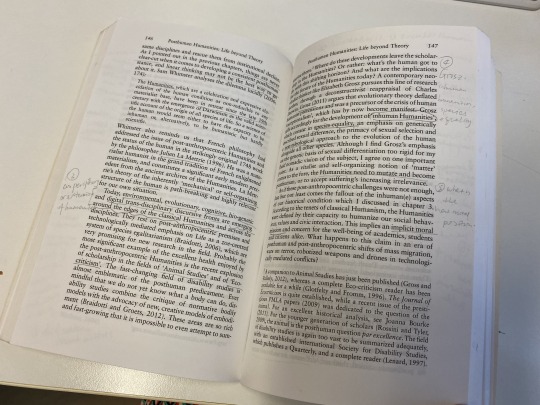
3. read to compare and write
This is the time I'm going through right now, developing my confirmation report and some other revision / paper projects. What precedents this stage is a rough structure of the thing you are writing - an outline and a few sentences to describe what you want to write for each section. These ideas are generated from the stew of type 1 and type 2 reading, and there is no linear process to reach them. But once you've got there, then you have better idea of what is the thing you are developing based on which topics or even authors you have read.
The writing / notes-taking in this stage happens directly in the work (paper or report) I developing and serves directly the objective of dedicated section. I will collect notes I've taken in the previous stages, locate the text in books/papers that is most relevant to my goal here, and write paragraphs in the paper. Note the writing here is not general introduction of theories, but really pinned down to specific views and their connections / differences.
4. read to go beyond / get new perspectives
The way academic research, particularly PhD research, is usually framed is a constant zooming in and narrowing down. But this can be dangerous sometimes. It is not uncommon in my reading hopping across different disciplines to find scholars in different fields are concerned with very similar problems with different vocabularies. Notably there are usually certain biases within a field that are not visible from within the field but only from a completely different field.
An example is that sustainable entrepreneurship is often stuck with either three intersecting circles of social, economic and environmental and a concentric model with economic in the middle circled by the social and then the environmental. But essentially both of them has an inherent dualism, viewing human and nature goals as competing, or seeing material and energy dependence the only connection between human and nature. Reading anthropology (e.g., Descola or Ingold) provides a completely different view on this.
Again this is probably against what "proper academic research" is supposed to be, but it is my belief that a lot of value could be created by these distant comparing and making sense of. So when I have some flexibility in time, I would attend speeches and seminars that seem don't have much to do with my topic, listen to non-relevant podcast and follow some of the interesting references they provide. This kind of reading is loose and free flow, without goals in mind. But I believe in the long-term they will become seeds feeding into another cycle starting from type 1 reading.
I do acknowledge that every research is different, so should be the strategies for reading. My way of learning is quite broad which may not make sense for everyone. I do think there is a big mystery in terms of how we are reading and writing and there are different patterns in different stages. You are welcome to share yours!
Photo credit
9 notes
·
View notes
Link
Saitō has hope for grassroots activism in Japan. “By small steps, we’re working to build a social movement for an equal, environmentally friendly, prosperous society.”
14 notes
·
View notes
Text

I am someone who is inclined to doomscroll. In my very-online young adult life, I am susceptible to all kinds of algorithmic traps on social media. Like many others online, I can quickly become hyperfocused on systemic violence, poverty, suffering, and environmental destruction. This trend has horrific impacts on our wellbeing; I myself have been to some very dark places. Pessimism becomes the only worthy default setting. How can any of us go on living in a world driven by billionaires for selfish gains at the expense of the individual, of their community, livelihood, and dignity?
In the past year and a half, I have been developing a new consciousness, a new way of thinking about wicked problems that are reduced to tiktoks posted a million times an hour. I found this possible as a result of my courses in ecological economics. Though it's a niche academic field that requires a systems-thinking approach, I think many of the ideas being discussed by modern scholars can easily be digested. They make deeper sense to me than anything I've studied so far. For these reasons, I think this information has the power to help us zoomers adopt a holistic worldview and a greater purpose as individuals and as a generation. I hope to share more accessible information on this blog and to foster discussion of sustainability that rejects corporate nonsense.
There is a lot more I could say in this post, and I will revisit this notebook page to summarize its content. But for now, this is just my introduction.
#studyblr#ecological economics#postgrowth#degrowth#the great simplification#sustainability#leftist#ecosocialism#environmental justice#collectivism#notebook
46 notes
·
View notes
Photo

scopOphilic_micromessaging_104 - scopOphilic1997 presents a new micro-messaging series: small, subtle, and often unintentional messages we send and receive verbally and non-verbally.
#scopOphilic1997#scopOphilic#brucemorrow#digitalart#NFT#micromessaging#nftart#graffitiart#graffiti#williamsburgbridge#brooklyn#nyc#streetart#LateCapitalism#RENK#PostGrowth#red#blue#shiney#2018#2017#2022
6 notes
·
View notes
Video
youtube
A little intro to post-growth
4 notes
·
View notes
Text
The other day I was chatting with people about post-growth society and ways to overcome capitalism and one person said "if a new system is to work it would have to offer a better alternative to the sweet sweet rush of buying and owning things" That kinda stuck with me.
60 notes
·
View notes
Text
Here is a list of studies, surveys and polling results that shed some light on popular perceptions of post-growth and post-capitalist ideas. Note: these studies are remarkable because respondents are willing to prioritize environment over economic growth even though they may assume that harming growth could have social downsides. It is reasonable to expect that, if respondents were informed that post-growth policy can improve social outcomes, support for these statements may be even stronger.
36 notes
·
View notes
Text
0 notes
Text
Book review: Post Growth, by Tim Jackson — The Earthbound Report
Book review: Post Growth, by Tim Jackson — The Earthbound Report
Tim Jackson’s Prosperity Without Growth is one of the most influential books on the postgrowth bookshelf, written in the wake of the financial crisis and clearly articulating the limits of economic growth as a measure of success. This book also comes in the wake of crisis, a time when “alongside an uncomfortable reminder of what […]Book review: Post Growth, by Tim Jackson — The Earthbound Report

View On WordPress
0 notes
Text
Tweeted
Nine years after it was first published, #ProsperityWithoutGrowth is no longer a radical narrative whispered by a marginal fringe, but an essential vision of #SocialProgress >> https://t.co/5UqO68B63o #summerreading #econ101 #secularstagnation #postgrowth #degrowth #neweconomics pic.twitter.com/PlZbSYxlwe
— CUSP (@CUSP_uk) June 22, 2018
0 notes
Link
via Twitter https://twitter.com/jdaviescoates
0 notes
Photo

Economic winter and the coming end of globalisation — forecastingintelligence The International Banker “As “free” market capitalism breaks down in a postgrowth era, command economies will be the logical fallback — both China and Russia already have hybrid state-capitalist economies, and as China extracts itself from the economic crisis its last few decades have guaranteed it, it’ll move further into a command economy […] via Economic winter and the coming end of globalisation — forecastingintelligence
0 notes